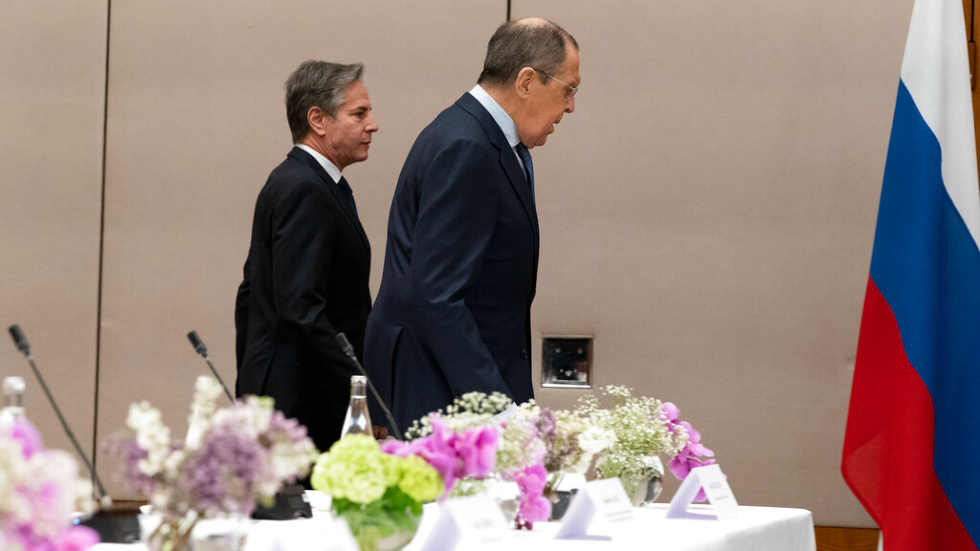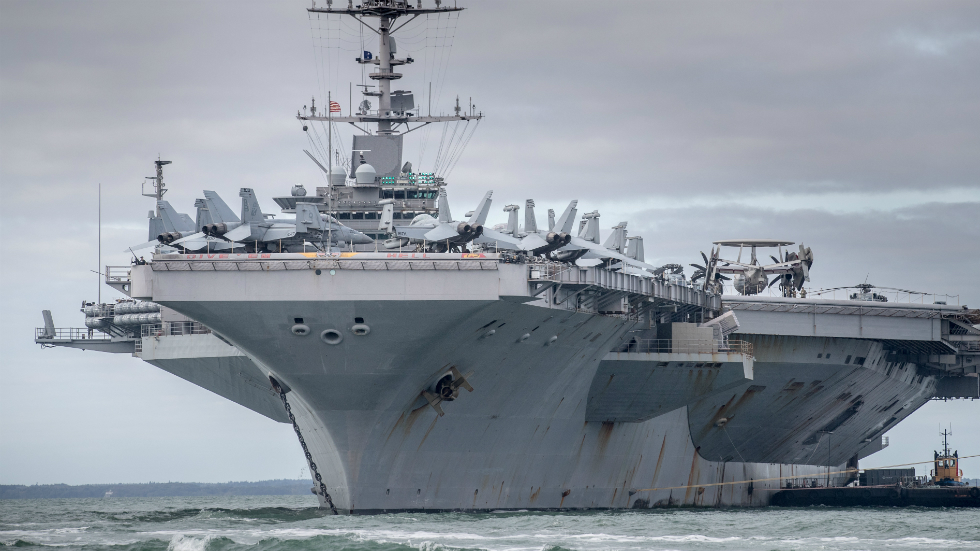Overnight Defense & National Security — US, Russia meet during ‘critical’ point

It’s Friday, welcome to Overnight Defense & National Security, your nightly guide to the latest developments at the Pentagon, on Capitol Hill and beyond. Subscribe here: digital-release.thehill.com/newsletter-signup.
Secretary of State Antony Blinken and Russian Foreign Minister Sergey Lavrov met in Geneva in a high-stakes meeting amid rising tensions between Russia, the U.S. and Ukraine.
More on the meeting and the Biden administration’s next move, plus details on the aircraft carrier strike group being sent to the Mediterranean and new sanctions on a Hezbollah financing network.
For The Hill, I’m Ellen Mitchell. Write me with tips at emitchell@digital-release.thehill.com.
Let’s get to it.
Blinken, Lavrov meet amid high tensions

Blinken and Lavrov met on Friday in Geneva but had no breakthroughs.
“We don’t expect to resolve our differences here today. But I do hope and expect that we can test whether the path of diplomacy or dialogue remains open,” Blinken told Lavrov during the meeting, The Associated Press reported. “This is a critical moment.”
What’s next?: In a press conference following the meeting, Blinken said the U.S. has agreed to provide, in writing next week, concerns the U.S. has and issues Russia has raised, as well as ideas the U.S. has to reduce tensions.
The two also agreed to continue conversations following the written proposal.
Blinken said a meeting between President Biden and Russian President Vladimir Putin is also on the table if it is believed that will push the situation in the right direction.
Threats: Russia has been amassing thousands of troops on the border with Ukraine as the international community continues to warn that tough actions will be taken against Moscow if they invade the former Soviet country.
Blinken said at the meeting he wants to use diplomacy to deescalate the situation but “if that proves impossible, and Russia decides to pursue aggression against Ukraine” it should expect to face “a united, swift and severe response.”
What’s on the table?: Military action has not been promised as a response to a potential Russian invasion of Ukraine, but Blinken and Biden have talked about severe economic sanctions.
Lavrov said during the meeting he did not “expect a breakthrough at these negotiations either. What we expect is concrete answers to our concrete proposals,” according to the AP.
Russia wants a promise from NATO that Ukraine will not be added to the alliance and wants western allies to remove military equipment and troops from eastern Europe.
The U.S. and allies have strongly rejected those terms as Russia continues to send troops near Ukraine’s border.
However, Blinken did tell Lavrov he had “concrete ideas to address some of the concerns that you have raised, as well as the deep concerns that many of us have about Russia’s actions.”
BIDEN HUDDLES WITH NATSEC TEAM
President Biden will meet with members of his national security team while spending the weekend at Camp David to discuss next moves on Russia.
“The president obviously is regularly briefed every day by his team, but he’ll also be engaging with them tomorrow over the course of the weekend as well,” White House press secretary Jen Psaki said Friday.
Biden is scheduled to depart for Camp David on Friday evening. The White House has been trying to send a clear message to Russia that any aggression toward Ukraine will be met with a severe response.
More coverage from The Hill:
- UK’s Johnson says Russian invasion of Ukraine would be ‘disaster’ for world
- Ukrainian president praises Biden for reaffirming US support
- US, Japan in ‘close consultations’ amid Russian tensions
A MESSAGE FROM HUAWEI

US sends carrier group to Mediterranean

The U.S. military has sent the USS Harry S. Truman aircraft carrier strike group to take part in a NATO naval exercise in the Mediterranean amid tensions between the West and Russia, the Pentagon’s top spokesperson announced Friday.
Neptune Strike 22 exercises, which are set to begin Monday and run through Feb. 4, will “demonstrate NATO’s ability to integrate the high-end maritime strike capabilities of an aircraft carrier strike group to support the deterrence and defense of the alliance,” press secretary John Kirby told reporters.
He added that the strike group, along with several other NATO allies he did not name, “will participate in coordinated maritime maneuvers, anti-submarine warfare training, and long-range strike training.”
Pay no attention to the timing: Kirby insisted the war games had been “long-planned,” since 2020, and were not in response to the recent Russian military buildup near the Ukrainian border, though the drills are not listed on NATO’s website among exercises slated for this year.
Shortly after the DOD announcement, NATO Secretary General Jens Stoltenberg added to speculation as to the timing of the maneuver when he tweeted that “NATO will always do what is necessary to protect and defend all Allies.”
He added that the participation of the U.S. vessel in Neptune Strike 22 displays “a strong sign of transatlantic unity.”
Other military moves: Spain has sent warships to the Mediterranean and the Black Sea and is mulling sending fighter jets to Bulgaria, while Denmark is sending a frigate to the Baltic Sea and France has offered to send troops to Romania.
The U.S. is also allowing three NATO allies — Estonia, Latvia and Lithuania — to send American-made weapons “from their inventories for use by Ukraine.”
SANCTIONS AGAINST HEZBOLLAH NETWORK
The Biden administration on Friday issued sanctions targeting an international financial network benefiting Hezbollah, the Lebanese-based political and military group designated as a terrorist organization by the U.S.
What they’ll do: The sanctions target three individuals and 10 companies that the administration says took part in actions to evade primary sanctions on Hezbollah to raise funds for the terrorist group through the international financial system.
“These financial facilitators have helped Hizballah obtain funds through networks of companies that disguise themselves as legitimate businesses,” Secretary of State Antony Blinken said in a statement. “The sanctions evasion efforts of those designated today are a stark example of how Hizballah abuses the international financial system to fund its acts of terrorism and illicit activities.”
Who and what was targeted: The sanctioned individuals include Lebanon-based members of Hezbollah, including Adnan Ayad, who is said to operate an international network of companies, and his son Jihad Adnan Ayad, a Hezbollah member who is also associated with his father’s businesses.
Treasury also sanctioned Ali Adel Diab, the son of sanctioned Hezbollah member Adel Diab and director and partner of the Zambia-based company Hamer and Nail Construction, which the U.S. also sanctioned as having provided material or financial support for sanctioned individuals.
The other companies sanctioned include eight that are based in Lebanon, one in Germany, and an additional company in Zambia.
Earlier: The sanctions issued on Friday build on similar measures announced earlier this week, when the Treasury Department announced sanctions against three Lebanese businessman and a Lebanese tourism company for financially supporting Hezbollah.
The U.S. designated Hezbollah a foreign terrorist organization in 1997 and a Specially Designated Global Terrorist Organization in 2001.
ON TAP FOR MONDAY
- NATO Secretary General Jens Stoltenberg will join a news conference alongside foreign ministers of Finland, Pekka Haavisto, and Sweden, Ann Linde, at NATO headquarters in Brussels at 11:30 a.m.
WHAT WE’RE READING
- China blasts US over ‘hegemonic’ missile sanctions
- Oath Keeper charges renew attention on Trump orbit
- Saudi airstrike kills 70 in Yemen
- The New York Times: Here’s one way a war might start
- Military.com: Details Emerge in Deadly Rollover Crash that Led to Charges Against Driver as Marines Identify Victims
- Military Times: It cost millions to recruit, train new troops being booted for vaccine refusal
A MESSAGE FROM HUAWEI

That’s it for today! Check out The Hill’s defense and national security pages for latest coverage. See you on Monday! {mosads}
Copyright 2023 Nexstar Media Inc. All rights reserved. This material may not be published, broadcast, rewritten, or redistributed.

